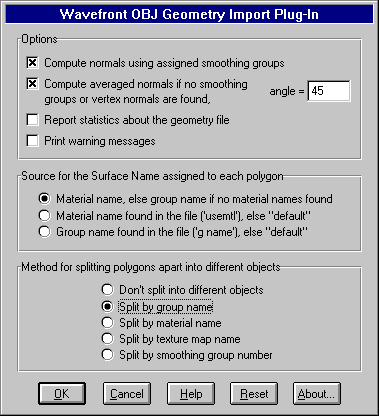 Wavefront Geometry Import Converter
Wavefront Geometry Import Converter Wavefront Geometry Import Converter
Wavefront Geometry Import ConverterThis geometry import converter reads in Wavefront 'OBJ' format files in their entirety, including vertex, normal and texture coordinates, as well as grouping and smoothing information. Many companies which sell 3D models provide their datasets in the OBJ file format, so you can use this converter to read in these data files and be guaranteed nice rendered results.

The converter will also read material definitions from a Wavefront material file (typically which has a file extension '.mtl') if the material file is referenced within the Wavefront geometry file (typically which has a file extension '.obj') using the 'mtllib' keyword. If one or more Wavefront material files are listed on a single line then all will be read into memory for possible reference by the geometry file.
The converter first reads the entire file into memory; this includes the vertex, normal and texture coordinate lists, their indice lists, all group names, material names and texture names, and the smoothing groups assigned to each polygon. Next, the converter computes new vertex normals for polygons that don't have any normals and that have a non-zero smoothing group assigned to them. If no smoothing groups are found then the converter optionally creates smoothed vertex normals based on the angle between abutting polygon faces. As a last step, the polygonal data is separated into separate objects based on a user-chosen criteria.
NOTES:
If any texture map names are found in the file (ie: if the 'usemap
If one or more group names are found on a 'g' line then they are appended all together to form the group name used internally (ie: 'g all airplane tail_fin').